#National Constitution Center
Text
California Gov. Gavin Newsom proposed Thursday adding a 28th Amendment to the U.S. Constitution, which he said will address the country's gun violence crisis.
The amendment would raise the minimum age to purchase a gun from 18 to 21, mandate universal background checks, institute a reasonable waiting period for all gun purchases and bar civilians from purchasing assault weapons, according to a statement from the Governor's office.
"This will guarantee states as well the ability to enact common sense gun safety laws, while leaving the Second Amendment intact, and respecting America's gun owning tradition," Newsom said in a video statement. "The 28th Amendment locks in the common sense constitutional protections that Democrats, Republicans, Independents and gun owners overwhelmingly support and ensures NRA-owned politicians can never strip those protections away."
6 in 10 Americans, including 4 in 10 gun owners, said controlling gun violence is more important than protecting gun rights – the highest percentage in a decade – according to a national poll released last month.
Newsom told Politico and NBC the move was inspired in part by the rollback of gun safety measures by the courts.
The move comes amid speculation that Newsom may run for President, which grew after he won a second term as Governor, which ends in 2026, and dropped $10 million on a new political action committee. Newsom has denied planning to run in 2024 or 2028, saying he supports President Joe Biden and wants Vice President Kamala Harris, a fellow Californian, to be President.
PROPOSAL SPARKS CRITICISM FROM GUN GROUPS
The move has drawn opposition from gun-ownership groups. A spokesperson for The National Rifle Association said in a statement to USA TODAY that the majority of Americans reject Newsom's "California-style gun control.”
“Newsom’s latest publicly stunt once again shows that his unhinged contempt for the right to self-defense has no bounds," the statement said. "California is a beacon for violence because of Newsom’s embrace of policies that champion the criminal and penalize the law-abiding."
Erich Pratt, senior vice president of Gun Owners of America said "Newsom's proposals will fail miserably to control crime."
"It's a foreign concept to wealthy anti-gun political elites like Mr. Newsom that the common people have a right to possess arms for self-defense and repelling government tyranny, so it's no surprise to us that he hopes to butcher that right with a new Constitutional amendment," he said in a statement to USA TODAY.
ADDING CONSTITUTIONAL AMENDMENT 'WON'T BE EASY'
Adding a constitutional amendment requires either a two-thirds majority vote by both houses of Congress or a constitutional convention convened by two-thirds of State legislatures, according to Thomas Donnelly, chief content officer at the National Constitution Center. None of the 27 amendments to the Constitution have been proposed by a convention and the last time the Constitution was amended was in 1992, he said.
Three-fourths of the states must ratify the proposed amendment in order for it to become part of the Constitution, Donnelly said. Donnelly declined to speculate on the likelihood of Newsom's success. But he said the process is "meant to be difficult."
"The Founders really wanted to limit new amendments to those that can actually secure the broad support of the American people, so for them, they would have said 'an idea that would transcend faction,'" he said. "Today, we would say it's often something that's going to transcend partisan politics."
Given the impact of the Supreme Court's landmark ruling on gun control last year, "something like a Constitutional amendment may seem absolutely necessary," according to Michael Waldman, president and CEO of the Brennan Center for Justice at NYU Law.
Waldman, author of "The Supermajority: How the Supreme Court Divided the Country," called Newsom's approach, which leaves the Second Amendment intact but allows for "common sense gun laws" that may be palatable to some gun rights supporters, creative and interesting. He said Newsom's amendment "is not likely to happen, but it's important to think about it."
"Constitutional amendments seem completely impossible to do until suddenly they seem doable, and that's how it's worked all throughout our history," Waldman said. "If the Court's doctrine is so misguided and the carnage on the streets is so undeniable, you might get a surprising outcome."
Newsom acknowledged how challenging the process would be, saying "this fight won't be easy, and it certainly won't be fast."
California State Sen. Aisha Wahab and Assemblymember Reggie Jones-Sawyer will introduce a joint resolution to make California the first state to call for a convention, also called an Article V Convention or amendatory convention, according to the Governor's statement.
Newsom will then work with "grassroots supporters, elected and civic leaders, and broad and diverse coalitions across the nation" to get similar resolutions passed in the 33 other states required to convene the convention, the statement said.
"California will be the first but that's just the beginning," Newsom said in a statement.
#us politics#news#usa today#california#2023#28th amendment#gov. gavin newsom#gun control#gun violence#gun rights#universal background checks#national assault weapons ban#assault weapons#minimum age of firearm sales#Mandatory waiting period for all gun purchases#national rifle association#Erich Pratt#Gun Owners of America#Thomas Donnelly#National Constitution Center#Michael Waldman#Brennan Center for Justice#us supreme court#Aisha Wahab#Reggie Jones-Sawyer#constitutional convention#us constitution
55 notes
·
View notes
Text

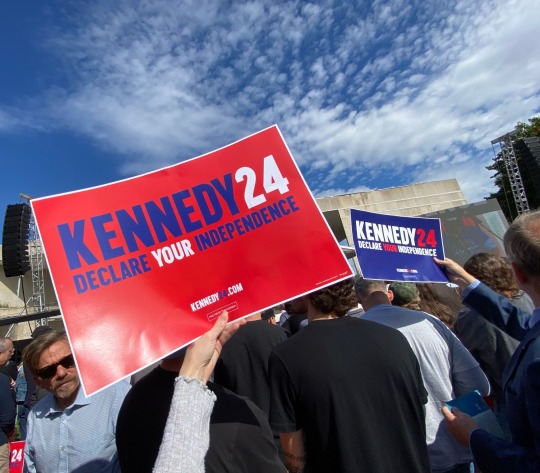




Robert Kennedy Jr. Official 2024 Independent Presidential Campaign announcement in Philadelphia, Pennsylvania at the National Constitution Center.
October 9, 2023
I had the honor to witness this historical announcement + meet the man himself, RFK Jr.! A day I’m forever grateful for & a day I’ll never forget.
Video on my YouTube:
youtube
#rfk jr#kennedy 2024#kennedy family#john f kennedy#its always sunny in philadelphia#philly#Philadelphia#national constitution center#independence#declare your independence#heal the world#city#artists on tumblr#2024 elections#presidents day#presidential election#politics#constitution#freedom#american values#Youtube
2 notes
·
View notes
Text
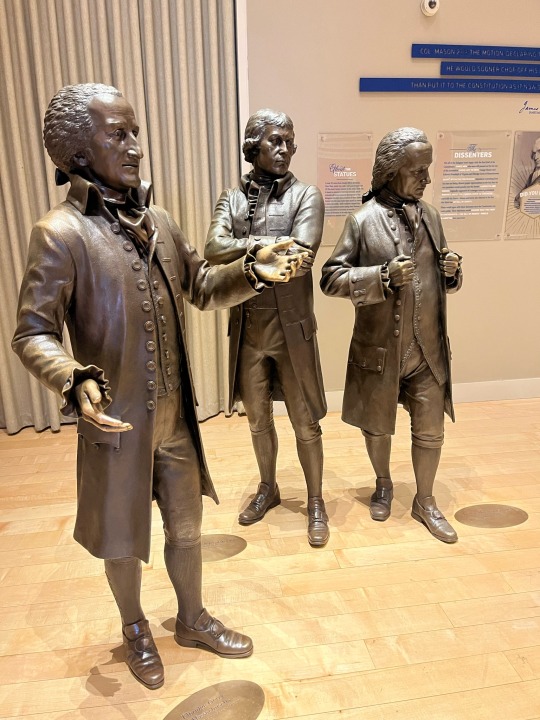
went to philadelphia today and my favorite picture I took by far is the looks of shame and judgement on three of the delegates who signed the constitution.
#philadelphia#national constitution center#I’ve looked at it multiple times today and it makes me laugh every time#meme potential
0 notes
Text

In a statement that was shared with The Nation, a group of 25 HLR editors expressed their concerns about the decision. “At a time when the Law Review was facing a public intimidation and harassment campaign, the journal’s leadership intervened to stop publication,” they wrote. “The body of editors—none of whom are Palestinian—voted to sustain that decision. We are unaware of any other solicited piece that has been revoked by the Law Review in this way. “
When asked for comment, the leadership of the Harvard Law Review referred The Nation to a message posted on the journal’s website. “Like every academic journal, the Harvard Law Review has rigorous editorial processes governing how it solicits, evaluates, and determines when and whether to publish a piece…” the note began. ”Last week, the full body met and deliberated over whether to publish a particular Blog piece that had been solicited by two editors. A substantial majority voted not to proceed with publication.”
Today, The Nation is sharing the piece that the Harvard Law Review refused to run.
Some may claim that the invocation of genocide, especially in Gaza, is fraught. But does one have to wait for a genocide to be successfully completed to name it? This logic contributes to the politics of denial. When it comes to Gaza, there is a sense of moral hypocrisy that undergirds Western epistemological approaches, one which mutes the ability to name the violence inflicted upon Palestinians. But naming injustice is crucial to claiming justice. If the international community takes its crimes seriously, then the discussion about the unfolding genocide in Gaza is not a matter of mere semantics.
The UN Genocide Convention defines the crime of genocide as certain acts “committed with the intent to destroy, in whole or in part, a national, ethnical, racial or religious group, as such.” These acts include “killing members of a protected group” or “causing serious bodily or mental harm” or “deliberately inflicting on the group conditions of life calculated to bring about its physical destruction in whole or in part.”
Numerous statements made by top Israeli politicians affirm their intentions. There is a forming consensus among leading scholars in the field of genocide studies that “these statements could easily be construed as indicating a genocidal intent,” as Omer Bartov, an authority in the field, writes. More importantly, genocide is the material reality of Palestinians in Gaza: an entrapped, displaced, starved, water-deprived population of 2.3 million facing massive bombardments and a carnage in one of the most densely populated areas in the world. Over 11,000 people have already been killed. That is one person out of every 200 people in Gaza. Tens of thousands are injured, and over 45% of homes in Gaza have been destroyed. The United Nations Secretary General said that Gaza is becoming a “graveyard for children,” but a cessation of the carnage—a ceasefire—remains elusive. Israel continues to blatantly violate international law: dropping white phosphorus from the sky, dispersing death in all directions, shedding blood, shelling neighborhoods, striking schools, hospitals, and universities, bombing churches and mosques, wiping out families, and ethnically cleansing an entire region in both callous and systemic manner. What do you call this?
The Center for Constitutional Rights issued a thorough, 44-page, factual and legal analysis, asserting that “there is a plausible and credible case that Israel is committing genocide against the Palestinian population in Gaza.” Raz Segal, a historian of the Holocaust and genocide studies, calls the situation in Gaza “a textbook case of Genocide unfolding in front of our eyes.”
#palestine#gaza#free palestine#end the the colonialism#end the occupation#harvard#harvard law review#genocide
7K notes
·
View notes
Text
Museums - Museen
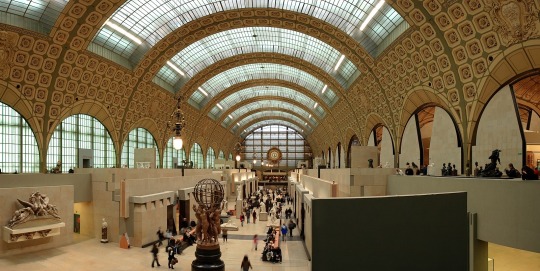
Source: Benh (2007), Main Alley Of The Musee d‘Orsay, Wikipedia, CC BY-SA 3.0 https://en.m.wikipedia.org/wiki/File:MuseeOrsay_20070324.jpg

Source: Musee d‘Orsay, Self-portrait, Vincent van Gogh, 1889, Public Domain
Travel guides usually list a variety of museums for each place that you can or even should visit - if you want to know where we come from, what is important to us or what defines us or has defined us at some point. I also strolled through one or the other museum because I saw it as part of my education. I just wanted to know and understand. It often took me to art museums - although I didn't have any real access to this "kind of art“ at the time (music, literature and movies rather touched my soul). And nowadays architecture and sculptures fascinate me even more than painting…as well of course landscapes: there is probably no more creative artist than nature itself. When visiting an art museum, it soon became customary for me to buy a museum guide to leaf through at home from time to time. There are a few museums that have stuck in my mind or that I simply like:

Source: Munch Museum, The Scream, Edvard Munch, 1893-1910, Public Domain
Musee d'Orsay (Paris): Accommodated in a beautiful old train station building, the museum contains an extensive collection of French Impressionists. Actually a "must" for everyone who likes this art epoch.
Munch Museum (the former museum in the Toyen district of Oslo): was a small, cute museum entirely devoted to the work of Edvard Munch. I was particularly impressed by the small presentation of pieces from his life - especially his first pictures from early childhood. If children of this age are still drawing stick figures, he has already drawn in perspective. So his talent showed quite early. Painters often seem to perceive the world differently than ordinary people. There is a similar presentation about van Gogh in the Van Gogh Museum in Amsterdam.
Prado (Madrid): My former school once disposed old school books - including old history books. These contained many beautiful illustrations and contemporary paintings - almost art books. I particularly liked leafing through the book about the Napoleonic Wars - because of my penchant for Napoleon. It also contained a painting by Francisco de Goya: "The Third of May 1808 in Madrid". Maybe why I often got stuck on it, because it reminded me of a scene from "War and Peace" (by Tolstoy): the shooting of alleged arsonists in Moscow. The cruelty of war: you die because you just took a wrong turn at the corner. That's why I wanted to go to the Prado in Madrid - to see this painting.
Hermitage (St. Petersburg): The museum is accommdated in the Winter Palace of the Romanovs. The building itself is a feast for the eyes - and of course the unmeasurable art treasures inside of it. We were particularly fascinated by the oversized vases made entirely of mosaics - something we had never seen before.
Roman Forum (Rome): Rome itself is actually an open-air museum - but the Roman Forum reinforces this impression. Many know the history of Rome from class, books (e.g. Colleen McCullough's series on the last years of the Roman Republic) or movies. You stroll through the streets, squares and gardens and regularly meet "old friends". You can really feel the importance and history of the place.
National Maritime Museum (London): The museum is the largest museum of maritime history in the world - a dream for anyone who is interested in that. Models of historical ships enough.
USS Constitution (Boston): A 19th-century US Navy frigate (sailing ship) - still "in service" although now only serving as a museum ship. The crew tells visitors the history of the ship in a lively and funny way, making a visit a fun affair.
Natural History Museum (London): The museum is one of the largest natural history museums in the world and is also located in a beautiful Romanesque-Byzantine building. When I visited the museum, there was a special exhibition on Charles Darwin. You could immerse in Darwin's world of ideas through carrying out experiments and by that understand his findings. This made science tangible. Incidentally, the Technical Museum in Munich follows the same approach: you understand physical phenomena by carrying out experiments (e.g. the behavior of waves at fixed or open ends).
Kennedy Space Center (Cape Canaveral): old rockets, space capsules, launch pads - a look into the history of the US space program and the preparation of current space projects. So much positive energy and enthusiasm for science and engineering. I was lucky that I was able to witness the launch of a space shuttle during my stay there (Space Shuttle Atlantis, Mission STS-86 to the Mir Space Station). A goosebump moment.
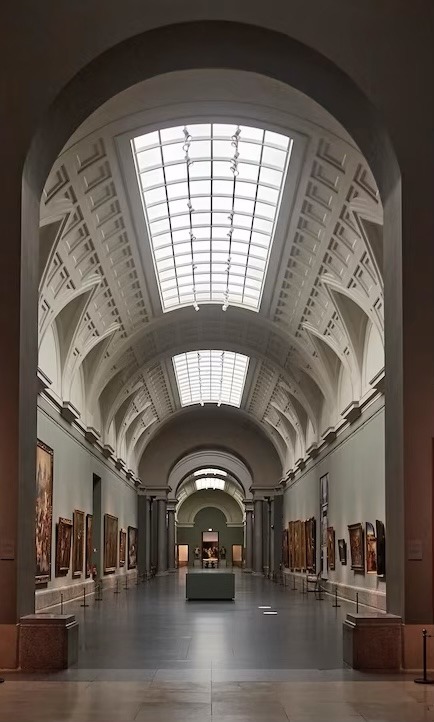
Museo Del Prado
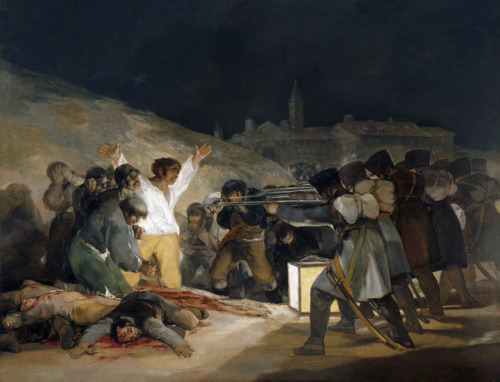
Source: Museo Del Prado, The Third of May 1808 in Madrid, Francisco de Goya, 1814, Public Domain
Reiseführer listen normalerweise für jeden Ort eine Vielzahl an Museen auf, die man besuchen kann oder sogar sollte - wenn man wissen möchte, wo wir herkommen, was uns wichtig ist oder uns ausmacht oder irgendwann ausgemacht hat. Auch ich schweifte durch das ein oder andere Museum, weil ich es als Teil meiner Bildung ansah. Ich wollte wissen und verstehen. Oftmals führte es mich in Kunstmuseen - auch wenn ich zu jener Zeit noch keinen richtigen Zugang zu dieser „Art von Kunst“ hatte (Musik, Literatur und Filme brachten meine Seele eher zum Schwingen). Und Architektur und Skulpturen faszinieren mich heutzutage dabei mehr als die Malerei….sowie natürlich Landschaften: es gibt wohl keinen kreativeren Künstler als die Natur selbst. Beim Besuch eines Kunstmuseums wurde es für mich bald usus, einen Museumsführer zu erstehen, durch den man auch ab und an zu Hause blättern kann. Es gibt ein paar Museen, die mir persönlich besonders im Kopf hängen geblieben sind oder die ich einfach gern mag:

Hermitage

Hemitage: Oversized Vases
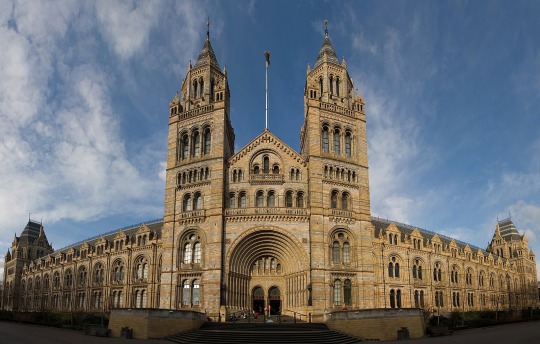
Source: Iliff, David (2006), The Natural History Museum, Wikipedia, CC BY-SA 3.0 https://en.m.wikipedia.org/wiki/File:Natural_History_Museum_London_Jan_2006.jpg
Musee d‘Orsay (Paris): Das Museum befindet sich in einem wunderschönen alten Bahnhofsgebäude und enthält eine umfangreiche Sammlung französischer Impressionisten. Für jeden, der diese Kunstepoche mag, eigentlich ein „Muss“.
Munch Museum (das ehemalige Museum im Stadtteil Toyen in Oslo): war ein kleines, schnuckeliges Museum, das komplett dem Werk von Edvard Munch gewidmet war. Besonders beeindruckt hat mich die kleine Präsentation von Stücken aus seinem Leben - insbesondere seine ersten Bilder aus früher Kindheit. Wenn Kinder in diesem Alter noch Strichmännchen malen, hat er schon perspektivisch gezeichnet. Sein Talent hat sich also recht früh gezeigt. Maler scheinen die Welt oft anders wahrzunehmen als gewöhnliche Menschen. Eine ähnliche Präsentation gibt es auch über van Gogh im Van- Gogh-Museum in Amsterdam.
Prado (Madrid): Meine ehemalige Schule entsorgte einmal alte Schulbücher - darunter auch alte Geschichtsbücher. Diese enthielten viele schöne Illustrationen und zeitgenössische Bilder - fast schon Kunstbücher. Im Buch über die napoleonischen Kriege blätterte ich besonders gern - aufgrund meines Faibles für Napoleon. Es enthielt auch ein Gemälde von Francisco de Goya: „Die Erschiessung der Aufständischen“. Vielleicht blieb ich deswegen oft daran hängen, weil es mich an eine Szene aus „Krieg und Frieden“ (von Tolstoi) erinnerte: die Erschiessung von vermeintlichen Brandstiftern in Moskau. Die Grausamkeit des Krieges: man stirbt, weil man an der Ecke nur falsch abgebogen ist. Deswegen wollte ich in Madrid unbedingt in den Prado - um dieses Gemälde zu sehen.
Eremitage (St. Petersburg): Das Museum ist im Winter-Palais der Romanows untergebracht. Das Gebäude selbst ist ein Augenschmaus - und natürlich die unermesslichen Kunstschätze darin. Besonders fasziniert waren wir von den überdimensionalen Vasen aus lauter Mosaiken - etwas, das wir in der Art noch nie gesehen hatte.
Forum Romanum (Rom): Rom an sich ist eigentlich ein Freilichtmuseum - aber das Forum Romanum verstärkt diesen Eindruck noch. Viele kennen die Geschichte Roms aus dem Unterricht, aus Büchern (beispielsweise Colleen McCullough‘s Serie über die letzten Jahre der römischen Republik) oder Filmen. Man wandelt durch die Strassen, Plätze und Gärten und trifft in schöner Regelmässigkeit auf „alte Bekannte“. Man spürt regelrecht die Bedeutsamkeit und Geschichte des Ortes.
National Maritime Museum (London): Das Museum ist das grösste Museum für Seefahrtsgeschichte der Welt - ein Traum für jeden, der sich dafür interessiert. Modelle historischer Schiffe satt.
USS Constitution (Boston): Eine Fregatte (Segelschiff) der US Marine aus dem 19. Jahrhundert - immer noch „im Dienst“, obwohl sie heute nur noch als Museumsschiff dient. Die Besatzung erzählt den Besuchern die Geschichte des Schiffs auf lebendige und witzige Weise, sodass ein Besuch eine kurzweilige Angelegenheit ist.
Natural History Museum (London): Das Museum ist eines der grössten naturhistorischen Museen der Welt und befindet sich zudem in einem wunderschönen romanisch-byzantinischen Bau. Als ich das Museum besuchte, gab es dort eine Sonderausstellung zu Charles Darwin. Man konnte selbst über gut gemachte Experimente in Darwins Gedankenwelt eintauchen und seine Erkenntnisse nachvollziehen. Wissenschaft wurde dadurch greifbar gemacht. Das Technische Museum in München verfolgt übrigens denselben Ansatz: man kann selbst physikalische Phänomene in Experimenten nachvollziehen (z.B. das Verhalten von Wellen an festen oder offenen Enden).
Kennedy Space Center (Cape Canaveral): alte Raketen, Raumkapseln, Startrampen - ein Blick in die Geschichte des US-Raumfahrtprogramms und in die Vorbereitung aktueller Raumfahrtprojekte. So viel positive Energie und Begeisterung für Wissenschaft und Ingenieurskunst. Ich hatte Glück, dass ich während meinem Aufenthalt dort, den Start einer Raumfähre miterleben konnte (Raumfähre Atlantis, Mission STS-86 zur Raumstation Mir). Ein Gänsehautmoment.

Kennedy Space Center - Launch Pad

Launch of Space Shuttle Atlantis STS-86
-Simplicius Simplicissimus
#traveling#museums#reisen#museen#musee d’orsay#munch museum#museo del prado#hermitage#eremitage#forum romanum#national maritime museum#uss constitution#natural history museum#kennedy space center#cape canaveral#simplicius simplicissimus
0 notes
Text
It is extremely disturbing how many posts I see claiming that Roe v. Wade was overturned on Biden's watch and blaming him and the Democratic Party for it. It's disturbing on a number of levels.
First, it was Trump and Bush-appointed justices who handed down the Dobbs decision. This is a flagrant example of blaming Democrats for things Republicans did, and not coincidentally is one of the the most widely felt differences between the two parties. As a result, it's usually the first example Democrats and their allies point to; this misappropriation suggests a deliberate attempt to undercut that fact.
Secondly, and related to the first point, it obfuscates who the real enemy is, and I am comfortable using word "enemy" to describe the Republican Party because of the policies they advocate and enact. The truth is that states controlled by the Republican Party were where the effects of Dobbs are most severely felt, while states controlled by the Democratic Party are passing laws to protect abortion. It is important to know which party opposes abortion and which party supports it. If the Republicans gain control of the House, Senate, and White House, they will pass a national abortion ban, as they have done at the state level in several places.
Thirdly, blaming Biden for Dobbs demonstrates a very concerning lack of understanding of how the government functions. The judiciary is its own branch of government; judges are appointed by the president and confirmed by the senate. It doesn't matter who is president when a decision is handed down, it matters who was president when the justices were appointed. People sometimes react to this by moving the goalposts and claiming the real issue was a failure by Democrats to "codify" Roe v. Wade. I am not sure what "codify" means in this context, and I'm not sure they are either. One thing it does not mean is that congress can pass a law saying "abortion is legal forever." Republicans could easily repeal such a law and it the federal government cannot necessarily prevent states from restricting abortion at the state level. Roe v. Wade was a ruling stating that the constitution guaranteed a right to privacy, which included the right to have an abortion. This prevented abortion restrictions in a way federal law cannot. That doesn't mean passing federal law protecting abortion is a bad idea, but it isn't a foolproof protection. It's fair to argue that the Democratic Party and the left of center generally were complacent about abortion. The form of this complacency was not taking the courts seriously, while the right spent fifty years openly filling the courts with anti-abortion judges.
The last thing that worries me is that this is popping up phrased almost the exact same way all over the place. I am afraid that it is not merely incompetence, but intentional misinformation, that is then repeated by the incompetent who believe it.
I know some will probably dismiss this post as being from a "vote harder" liberal Biden supporter, but whatever your feelings about Biden, the Democratic Party, or the democratic process in the U.S., you should care about the truth. The truth is that Roe v. Wade was overturned by Republican-appointed judges and abortion bans are being enacted by Republican elected officials, and Joe Biden opposes these things. You can do with that information whatever you wish, but you denying it is dishonest.
#you can't build a leftist movement on dishonesty#i might have to mute this one too but i needed to say it
5K notes
·
View notes
Photo



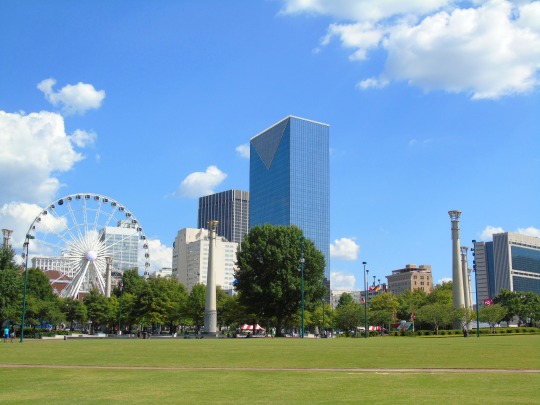





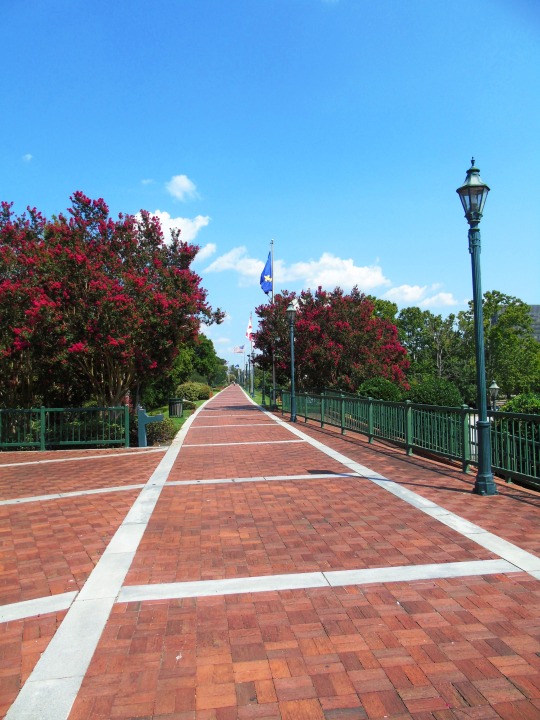
Georgia became the fourth state to ratify the United States Constitution on January 2, 1788.
#Georgia#US Constitution#ratified#2 January 1788#anniversary#US history#Savannah#original photography#summer 2016#cityscape#architecture#Martin Luther King Jr. National Historic Site#Atlanta#tourist attraction#USA#landmark#Savannah River#Centennial Olympic Park#Augusta#The Martin Luther King Jr. Center for Nonviolent Social Change#Augusta Cotton Exchange#Forsyth Park#Colonial Park Cemetery
1 note
·
View note
Text
"Palestinian plaintiffs and their legal representatives on Friday [January 26, 2024] presented a powerful case in federal court accusing President Joe Biden and other top US officials of complicity in Israel's genocide in Gaza.
People around the world tuned in for the long-awaited hearing in Oakland, with plaintiffs appearing in person and over Zoom in an unprecedented effort to hold the Biden administration accountable for its actions in Gaza.
The Center for Constitutional Rights (CCR) filed the lawsuit in November 2023 on behalf of Defense for Children International–Palestine, Al-Haq, and eight Palestinians in the US and Palestine. The complaint accuses President Joe Biden, Secretary of State Antony Blinken, and Secretary of Defense Lloyd Austin of failing to live up to their legal responsibilities under the 1948 Genocide Convention and the 1988 Genocide Convention Implementation Act.
The United Nations convention classifies complicity in genocide, or the intentional destruction of a people in whole or in part, as a crime under international law and requires that states take measures to prevent such atrocities.
[Note: This is a big reason why politicians almost never call it a genocide, btw. Because if a country recognizes that it's a genocide, then they actually are legally required to do a bunch of things to stop it, under international law.]
The historic lawsuit contends that the Biden administration has failed to uphold its obligations by continuing to provide diplomatic and military support for Israel's brutal campaign in Gaza. Plaintiffs are asking the court to stop Biden from sending more weapons and munitions to Israel that are being used to kill Palestinians en masse.
The hearing before the US District Court for the Northern District of California took place just hours after the International Court of Justice issued provisional measures against Israel in a landmark case brought by South Africa.
-via TAG24, January 26, 2024. Article continues below.
Court contends with questions of jurisdiction and responsibility
In evaluating the allegations, questioning in Friday's hearing revolved around the so-called political question doctrine, by which federal courts regularly refrain from ruling on political matters seen as best resolved by the president and Congress.
The Department of Justice argued that according to the doctrine, the court has no jurisdiction to rule in the case.
"If the court condemns United States foreign policy toward Israel, it could cause international embarrassment and undermine foreign policy decisions in the sensitive context of the Israeli-Palestinian conflict," defense counsel Jean Lin told Senior District Judge Jeffrey S. White.
Katherine Gallagher of the CCR countered that the court does, indeed, have a responsibility to step in: "Here, the question is a legal one, whether the actions undertaken by the United States failed to uphold the obligation to prevent genocide, and that is an active obligation that requires that the United States not provide the means by which a genocide is being furthered."
"There is no discretion for any state to evade its obligations, its legal obligations. These are not policy decisions," she said.
Palestinian plaintiffs share powerful testimonies before the court
After legal arguments in the case, Judge White heard two hours of gut-wrenching testimony from Palestinian plaintiffs and a renowned Holocaust and genocide expert.
Rubin Presidential Chair of Jewish History at Wake Forest University Dr. Barry Trachtenberg shared his remarks before the court in spite of vehement US government opposition.
"To have an event fall under the 1948 Convention on Genocide requires both action and intent, and here we see that very, very clearly in a way that seems really quite unique in history," he stated, noting that there is now an opportunity to stop Israel's unfolding genocide in real time to prevent further loss of lives...
Judge White said he would take the testimonies to heart as he evaluates his constitutional responsibilities, describing the case as "the most difficult judicial decision" he has ever had to make."
-via TAG24, January 26, 2024
-
Note: I know a lot of people are really not gonna appreciate that last line. I'm not thrilled with it either. But it is worth noting that having a federal court overrule the US president's huge foreign policy and military decisions would be an absolutely massive deal/precedent
This is a case that deserves to be ruled on with an incredible amount of seriousness, if only because if you're a federal judge who's going to make that call, your written decision/legal justification needs to be unimpeachable
That said, if the judge uses jurisdiction to pass the buck here and avoid his legal and human responsibility to do what he can to stop a genocide, I'm gonna be pissed
#palestine#cw war#free palestine#united states#us politics#oakland#california#legal system#foreign policy#war crimes#cw genocide#anti zionisim#isreal#current events#good news#hope#also this decision runs right up against the fact that#if US citizens can sue the US for war crimes/violating international law#and actually force change#then suddenly the gates will open to similar lawsuits for EVERY future war#which btw they SHOULD and international humanitarian law SHOULD be enforceablle#and it will also be a major step forward for something the US is trying really really hard to stave off#which is being investigated/sued by the International Criminal Court for war crimes during the Afghanistan and Iraq wars#or you know be held accountable for those war crimes in any way#which again I AM ALL FOR#genuinely how do you stop rich white countries from committing war crimes without an actual way to hold them accountable#and actually enforce international law#reminder that all posts related to the war are tagged palestine and cw war
2K notes
·
View notes
Text
Though the Centers for Disease Control and Prevention has stopped counting Covid-19 cases, according to wastewater data—which emerged early on as an accurate tracker of the ebbs and flows of the virus—we are currently in one of the biggest surges of the pandemic, amid the spread of a new variant, JN-1, as the virus keeps mutating. More than three-quarters of U.S. hospital beds are currently in use due to Covid hospitalizations. Uptake of the most recent booster shot, which should help to protect against the new variant and lower the risk of severe cases and the odds of getting long Covid, hovers around 19 percent.
Meanwhile, the most recent White House response to a question about whether they had any guidance for hospitals, some of which have brought back mitigation protocols in response to the most recent Covid spike, came courtesy of press secretary Karine Jean-Pierre: “Hospitals, communities, states, they have to make their own decisions. That’s not something we get involved in,” she replied, appearing exasperated.
“We are in possibly the second-biggest surge of the pandemic if you look at wastewater levels,” said Dr. Monica Verduzco-Gutierrez, who runs a long-Covid clinic at the University of Texas, San Antonio, and has had ongoing Covid symptoms since August 2022. “There is no urgency to this. No news. No discussion in Congress. There is no education.”
[...]
Since the Biden administration declared the end of the national emergency in May, Americans across the political spectrum have largely followed the example set by the government and entirely disposed of any level of Covid precautions. Liberal and left-wing outlets have participated in the normalizing of Covid too, dismissing or even ostracizing people who still take precautions as if they are tin-hat conspiracy theorists. “We can’t be in lockdown forever,” has become a common refrain, as if wearing a mask on the subway constitutes “lockdown.”
In September, Biden himself participated in the spread of this kind of harmful disinformation when he declared the pandemic “over” on 60 Minutes. “If you notice, no one’s wearing masks,” he said. “Everybody seems to be in pretty good shape.” This is, essentially, governing via “vibes”—so much for “following the science.”
[...]
The consequences of discarding all Covid precautions are becoming clearer, as more people get repeated infections and long-term symptoms, amid an alarming spike in heart problems among healthy young people. People are getting sick more often not due to the myth of “immunity debt,” which posits that the lack of exposure to other people during lockdown has made people less able to fight off infections (three years later), but because Covid weakens the immune system. Each time someone contracts Covid, the odds of long-term complications increase.
520 notes
·
View notes
Text
A group of Democratic senators introduced a bill Thursday that would radically change the makeup of the Supreme Court, amid ongoing concerns over court ethics and its increasingly conservative makeup.
The legislation would appoint a new Supreme Court justice every two years, with that justice hearing every case for 18 years before stepping back from the bench and only hearing a “small number of constitutionally required cases.”
“The Supreme Court is facing a crisis of legitimacy that is exacerbated by radical decisions at odds with established legal precedent, ethical lapses of sitting justices, and politicization of the confirmation process,” Sen. Cory Booker (D-N.J.) said in a statement.
“This crisis has eroded faith and confidence in our nation’s highest court. Fundamental reform is necessary to address this crisis and restore trust in the institution.”
Only the nine most recently appointed justices would hear appellate cases, which make up a bulk of the court’s work. All living justices would participate in a smaller subset of cases under the court’s “original jurisdiction,” such as disputes between states or with foreign officials.
The bill was introduced by Sens. Booker, Sheldon Whitehouse (D-R.I.), Richard Blumenthal (D-Conn.) and Alex Padilla (D-Calif.), and it was co-sponsored by Sens. Mazie Hirono (D-Hawaii), Jeff Merkley (D-Ore.), Peter Welch (D-Vt.) and Brian Schatz (D-Hawaii).
Calls for Supreme Court reform grew louder this year after ProPublica revealed that Justice Clarence Thomas received hundreds of thousands of dollars worth of perks from conservative political donors. Further investigations have uncovered multiple significant and undisclosed gifts from politically connected friends over his time as a federal judge.
Justice Samuel Alito also took a luxury vacation paid for by an influential conservative donor while in the judiciary, another investigation found earlier this year.
The Senate Judiciary Committee advanced a bill earlier this year along party lines that would require the Supreme Court to create and abide by a code of ethics. Unlike lower courts, Supreme Court judges are not beholden to an official ethics code.
“An organized scheme by right-wing special interests to capture and control the Supreme Court, aided by gobs of billionaire dark money flowing through the confirmation process and judicial lobbying, has resulted in an unaccountable Court out of step with the American people,” Whitehouse said in a statement.
“Term limits and biennial appointments would make the Court more representative of the public and lower the stakes of each justice’s appointment, while preserving constitutional protections for judicial independence.
“As Congress considers multiple options to restore the integrity of this scandal-plagued Court, our term limits bill should be front and center as a potential solution,” he added.
Attempts to reform the Supreme Court have been denounced by both Republicans in Congress and by some members of the court, namely Thomas and Alito.
Alito argued earlier this year that Congress does not have the authority to force any reform on the court without a constitutional amendment.
“I know this is a controversial view, but I’m willing to say it,” Alito told The Wall Street Journal. “No provision in the Constitution gives them the authority to regulate the Supreme Court — period.”
But Whitehouse’s office argued in Wednesday’s statement that the Constitution allows Congress to regulate how the court handles appellate cases from lower courts. That’s why all justices would still weigh in on “original jurisdiction” cases, avoiding the constitutional hang-up.
Trust in the Supreme Court remains near all-time lows, according to national opinion polling. A Gallup poll last month found that just 41 percent of Americans approve of how the Supreme Court is doing its job, with 58 percent disapproving.
373 notes
·
View notes
Note
I am not Israeli so maybe I understood wrong how this country works but... there are arabs living there who are Israeli, right? It is not a full jewish state and I guess that arab Israeli are equal to jewish Israeli? So, where does this idea come from that Israeli do not want to live with arabs when... some of them are part of their population? Also, another question that comes to my mind but what would the arab Israel become under the Hamas' rule? We know they want the jewish population all dead but aren't the arab Israeli traitors? Will not they be slaughtered too? Is that when the internet will understand that the Hamas is just a death group, when they will have slaughtered the "right" group in their books, or will the Hamas be supported as them killing traitors? I don't want to come as someone who is trying to say that some Israeli are more worthy than the others, it is just that I am wondering because on the internet, when they talk about Israeli it is always "The Jews" not the global population.
Arab-Israeli citizens constitute 20% of the population and are the largest minority in Israel, not counting other Arabic-speaking minorities like the Druze, Bedouins and Circassians. Israel is indeed a 'full Jewish state' in the sense that its anthem, official calendar, official language and official holidays are all centered around Judaism both as a religion and an ethnicity. Arabic is legally considered the 2nd national language (after Hebrew) and while Islamic/Christian/Druze/Circassian holidays/traditions are not legally enshrined individually, they are legally respected/accepted in workplace laws and in other relevant fields (like medicine for example). While that is all true, it is a known fact that Arab communities receive less public funding from the govt (for a myriad of reasons that could entirely fill another post, and especially the current govt) which affects the lvl of education they can offer and other public services. Taking that into account, Arab-Israelis still outrank their counterparts from neighboring countries (and the whole MidEast if were being honest) both financially and on a societal lvl, living in a liberal country.
To answer ur 2nd question - yes, theyd absolutely be murdered by Hamas. 20+ Arab-Israelis were mercilessly killed and kidnapped on October 7th, it didnt matter to Hamas at all that they spoke Arabic or that they werent even "fully Israeli" (like the guy from East Jerusalem who was murdered on cam). They indeed called them traitors, Jewish dogs and other fun names.
People also tend to forget that, when the war for independence broke out, Jews werent the only ones fighting the pan-Arabists. In fact, several Arab communities (e.g., Abu Gosh) joined the Jewish Yishuv, and the Druze made a wholeass bloodpact with the Jews. And...Israel also houses a bunch of Lebanese chads too.
Israel could do a whole lot better in how it treats its Arab population (for starters, getting rid of that disgusting Law of Nation), but to say that theyll fare better under the kind of Islamic theocracy Hamas offers or the pan-Arabist communist utopia the PA and PFLP are offering is absurd.
Israel is not "just Jews", youre right. Its primarily Jews, and its main function as a country is to be a homeland for Jews, but it has a wholelotta other ppl that deserve to keep living and thriving here as equal citizens, and inshallah us Normal People will continue pushing them more into the public spotlight and pressure this cunt of a govt (and its successors) into further improving their conditions.
260 notes
·
View notes
Text
In September 2022, the Australian High Court upheld a law that effectively allows “preventative incarceration,” or the imprisonment of people even after their sentence has been served, based on whether or not a court thinks the prisoner might be at risk of committing a future crime.
Indigenous people make up 4% of the population of Western Australia, but 40% of the state’s prisoners are Indigenous.
At Western Australia’s Banksia youth prison, 75% of incarcerated youth are Indigenous.
Australia allows for the imprisonment of children as young as 10 years old.
---
Excerpt:

Casuarina prison is a sprawling, concrete jungle on the southern outskirts of Perth, Western Australia (WA). It is a maximum-security, adult facility, home to people who may never leave its confines. However, on July 20, the penitentiary “welcomed” a new cohort of prisoners: 17 kids under the age of 18, who had been moved from the Banksia Hill Juvenile Detention Center to Casuarina [...].
When current WA Premier Mark McGowan was elected in 2017, his Labor party promised to lower the rate of Indigenous incarceration in the state, which is the highest in the nation. First Nations people are 16 times more likely to be incarcerated in WA than non-Indigenous people, a number that has only risen despite the promise of the government.
Dr. Hannah McGlade, a Noongar academic and human rights lawyer, isn’t surprised by the state’s failure to uphold its promise. “Our government cares little for Aboriginal lives,” McGlade told The Diplomat. [...]
In the past month, the Australian High Court upheld a law designed to keep the worst offenders in prison indefinitely, even after their sentences have been complete.
Known as the High Risk Serious Offenders Act (HRSOA), the legislation was challenged in Australia’s apex court when Peter Garlett, a 23-year-old Noongar man, was imprisoned after stealing AU$20 and a necklace while pretending to be armed. Despite this being his first adult offense, when his sentence was up, the Western Australian government asked the High Court to keep Garlett, now 28, in prison.
The court agreed, effectively paving the way for preventative incarceration in Australia.
Though five of the seven High Court judges upheld the constitutional validity of the HRSOA, many academics, lawyers, and activists who deal with the lives of First Nations people inside the legal system on a regular basis, note that this will only further trap Indigenous Australians in the carceral system. Garlett had been in near-continuous detention since he was 12, and this became the rationale for keeping him in prison beyond his criminal sentence.
One of the judges even hypothesized that the law could “potentially lead to the imprisonment of one seventh of the entire prison population of Western Australia for offenses that they have not committed.” [...]
“This is a crystal-clear example of an indirectly discriminatory law: one that is not discriminatory in its express terms but is discriminatory in its practical effect.” [...]
Though Indigenous people make up less than 4 percent of the state population, nearly 40 percent of Western Australia’s prison population is Indigenous. That is particularly troubling given the horrific record of Australian prisons. Since the Royal Commission into Aboriginal Deaths in Custody in 1991, over 500 First Nations people have died while imprisoned in Australia. In 2020-2021 alone, 13 prisoners died in custody in WA – five of them Aboriginal.
No custodial or police officer has ever been found criminally responsible for any of these deaths.
The structural forces pushing Indigenous people into Australia’s prisons start early. In the Banksia Hill Juvenile Detention Center, three-quarters of the inmates are Indigenous. Despite its mandate to rehabilitate people for their eventual release, reports show some of the prisoners receiving as little as five hours of education a month. In April, the state’s prison watchdog outlined a series of “cruel, inhumane, and degrading” treatments in the facility’s Intensive Support Unit. Children have reportedly made suicide pacts due to their treatment, with some being kept in isolation for 23 hours a day. [...]
Penglis and McGlade point to the age of imprisonment in Australia being only 10 years old as devastating. [...]
---
Text by: Dechlan Brennan. “How Western Australia Criminalizes Indigenous Children.” The Diplomat. 7 October 2022. [Italicized first lines/heading in this post added by me.]
2K notes
·
View notes
Text
To understand the full context of the American-led ‘53 coup against Mosaddegh in Iran it is imo critical to recognize anti-communism as a proximate cause. Write-up below:
It is commonly understood that the early decades of the 20th century in Iran are characterized by British colonial extortion of material resources (mostly oil) within the boundaries of “Persia” (pre-1935) / “Iran” (post). The penultimate monarchical dynasty, the Qajars, were ousted in 1925—but the exile of the last Qajar Ahmad Shah was the direct result of the 1921 military coup led by then-Reza Khan (later the first “Pahlavi”, Reza Shah) which was directed by Britain. And at this time, British anxieties heavily featured concerns about Bolshevik encroachment from the Caucuses (not just through the newly-formed Azerbaijan SSR, but also through domestic sympathizers that fueled such projects as large as the transient Persian SSR, put down by Reza Khan after Soviet withdrawal).
This is stage-setting. Of course, by the 50s, in tandem with Cold War thread-pulling, the Anglo-Iranian Oil Company constituted a thirsty tentacle of British imperialism sucking Abadan dry and contributing pittances to the local economy. It was in the midst of decades of growing resentment against this presence that Mosaddegh became Prime Minister in 1951 as the leader of the broad National Front coalition, and we are familiar with how intensely he campaigned for nationalizing the country’s oil and how pissy this made the British (here’s one and another post on the subject if not).
Here’s the detour: you may know that it was the CIA, an American institution, that orchestrated the ‘53 coup to oust Mosaddegh. But we were just now discussing threats against British colonial power in Iran. How did things get from B to A, as it were? We can’t take this for granted.
The British in fact spent the intervening two years trying to get Mosaddegh out by mobilizing the Shah and various right-wing (often clerical and mercantile) interests in Iran (this point, and much of what follows, draws from bits of Darioush Bayandor’s Iran and the CIA and Mostafa Elm’s Oil, Power, and Principle). They spent the same two years desperately trying to get the Americans on board with their efforts. But—here it is—the Truman regime and American foreign policy was in general intensely hostile to this strain of British interventionism in Iran, going so far as to issue warnings against it.
Why? Well, as you would expect, the Americans were concerned about Soviet influence in the region. Then-U.S ambassador in Tehran Henry Grady claimed that “Mosaddegh’s National Front party is the closest thing to a moderate and stable element in the national parliament” (Wall Street Journal, June 9 1951). This summarizes the American position at the time: Mosaddegh’s nationalist movement constituted the bastion against communism, and the US was very interested in the survival of this bastion lest Iran align with the USSR.
What happened between 1951 and 1953 is that British pressure, operating through the Shah and more conservative elements of the Iranian government, jeopardized moderate support for Mosaddegh. With the right and center-right against him an entire wing of National Front coalition was falling off, and Mosaddegh found himself leaning more and more on the strengthening Tudeh Party, which had grown in numbers to militaristic significance during Mosaddegh’s tenure (including a network of at least 600 officers in the state military). Tudeh, of course, was the pro-Soviet communist party in Iran. And now the threads come together.
It was in this context of Mosaddegh, backed into a corner with almost only the communists behind him, that the CIA released a memo on November 20th, 1952 singing a very different tune:
It is of critical importance to the United States that Iran remain an independent and sovereign nation, not dominated by the USSR...
Present trends in Iran are unfavorable to the maintenance of control by a non-communist regime for an extended period of time. In wresting the political initiative from the Shah, the landlords, and other traditional holders of power, the National Front politicians now in power have at least temporarily eliminated every alternative to their own rule except the Communist Tudeh Party...
It is clear that the United Kingdom no longer possesses the capability unilaterally to assure stability in the area. If present trends continue unchecked, Iran could be effectively lost to the free world in advance of an actual Communist takeover of the Iranian Government. Failure to arrest present trends in Iran involves a serious risk to the national security of the United States.
And (!!!)
In light of the present situation the United States should adopt and pursue the following policies:...
Be prepared to take the necessary measures to help Iran to start up her oil industry and to secure markets for her oil so that Iran may benefit from substantial oil reserves...
Recognize the strength of Iranian nationalist feeling; try to direct it into constructive channels and be ready to exploit any opportunity to do so
It took two tries for the CIA to bring about a coup that removed Mosaddegh from power, but the objective of this coup was not the preservation of British control over Iranian resources; it was the maintenance of the Western sphere of influence against communist revolution (this was further prioritized by the arrival of the Eisenhower administration). In fact, after the coup the Anglo-Iranian Oil Company (now renamed British Petroleum) had to make room for six other companies from the US, France, and the Netherlands as part of a consortium, and this consortium would split profits with Iran 50/50. This is, to be clear, still colonialist extraction! But it constitutes a huge blow to British economic interests, because they were never the CIA’s goal. This is part of why the post-coup government is characterized far more as a US puppet than a British one.
It does remain that this was a sequence of events very much set in motion because of actions taken by the British government; by the time they managed to get shit to hit the fan, though, it was very much no longer in their control where the shit was flying.
475 notes
·
View notes
Text
(CNN) - In new clarifying guidance announced Monday, the Biden Administration said that federal law preempts state abortion bans when emergency care is needed, and that the federal government can penalize institutions or providers that fail to provide necessary abortions to treat medical emergencies.
"Under the law, no matter where you live, women have the right to emergency care — including abortion care," HHS Secretary Xavier Becerra said in a news release Monday. "Today, in no uncertain terms, we are reinforcing that we expect providers to continue offering these services, and that federal law preempts state abortion bans when needed for emergency care."
In more than a dozen states, legal fights are underway over abortion bans and other laws that strictly limit the procedure after the US Supreme Court ended a constitutional right to an abortion on June 24.
In a letter to the nation's health care providers on Monday, Becerra said a federal statute called the Emergency Medical Treatment and Active Labor Act (EMTALA) protects providers' clinical judgement and the actions they take to provide stabilizing treatment to pregnant patients who are experiencing emergency medical conditions, regardless of restrictions in any given state.
EMTALA has been on the books since 1986. It specifically requires all patients get the appropriate medical screening, examination, stabilizing treatment and transfer to an appropriate facility if necessary.
The administration said examples of emergency medical conditions may include, but are not limited to, ectopic pregnancy -- when the fertilized egg grows outside a woman's uterus -- and complications of miscarriages. Stabilizing treatment could include abortion.
Becerra said if a state law bans abortion and does not include an exception for the life and health of the pregnant person, that state law is preempted by the federal statute.
"We heard a lot from physicians that we needed to be clearer on these points because people were still too scared to treat people," a senior adviser with HHS said in a background briefing with the media. The guidance today is "meant to try to provide that reassurance here on the clinical judgment of these physicians and hospitals."
HHS said it will do everything within its authority to ensure patients get the care they need.
The statute applies to emergency departments and other specific clinical settings. Providers also will not have to wait for a patient's condition to worsen to be protected by this statute.
If a hospital is found in violation of this statute, a hospital could lose its Medicare and Medicaid provider agreements and could face civil penalties. An individual physician could also face civil penalties if they are found in violation.
Under the statute HHS may impose a $119,942 fine per violation for hospitals with over 100 beds, $59,973 for hospitals under 100 beds. A physician could face a $119,942 fine per violation.
"We are making enforcement a priority," a senior HHS official said.
A memo from the Centers for Medicare and Medicaid Services said that hospitals should ensure that all staff who may encounter an emergency situation with a pregnant person be aware of the hospital's obligation under EMTALA.
The statute also contains a whistleblower provision that prevents retaliation by the hospital against its employee who refuses to transfer a patient with an emergency medical condition that has not been stabilized by the hospital. A link on the CMS website allows people to file an EMTALA complaint.
The enforcement of EMTALA depends on people making a complaint to the government. An investigation can only follow if a complaint is made.
"Health care must be between a patient and their doctor, not a politician," said Becerra in a news release. "We will continue to leverage all available resources at HHS to make sure women can access the life-saving care they need."
3K notes
·
View notes
Text
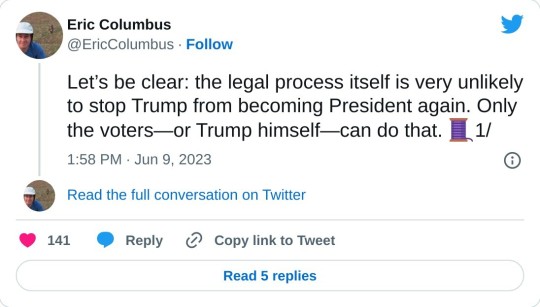
If you are interested in an example of what I mean by the US constitutional system being antiquated, here is a nice summary thread of how Trump's indictment for jeapordizing national security and nuclear secrets, amoung other things, legally affects his campaign:
Since the investigation is unlikely to result in a conviction before the election, once elected since it is a federal case Trump, as head of the DoJ, can simply toss out the charges against himself
If Trump is convicted, if he isnt jailed it doesnt impact his ability to serve as President
If he is somehow jailed, he can submit a writ petition to be released from jail to serve as president which all precedent says would be granted
As President, Trump might actually be able to pardon himself for his own crimes because you need 'standing' to challenge actions legally and since its his own crimes he is his own other party, so that person might not exist
Finally, even if he was convicted of treason due to 1/6, it likely would not bar him from being president under the 14th amendment due to wording there about being an 'officer'
Additionally, since the terms for being President are defined by the constitution, congress cannot change them without a constitutional amendment.
But I actually have a final point; most of this is a *probably*. These would be decided, on the fly, after the election, by individual courts like SCOTUS. If you, for idk some reason or another, wanted to know if someone running for President was going to be a convicted criminal serving his term from a jail cell or not, the *only option* you have is to fuck around and find out. We are legally barred from determining how the system will function ahead of the question.
Other systems individually face issues like this - is the executive the head of the judiciary? A common-enough setup. Its the confluence of them, of how neatly the system has aligned to just fall apart on the question of justice for someone sufficiently politically powerful - which was by design, an intent to make a 'weak center'.
There are tradeoffs in systems, and this is not an example of that; its a full break.
319 notes
·
View notes
Text
Tomorrow, Friday November 17, the German Bundestag will vote on a draft law that could decide that naturalization for residents would be dependent on a commitment to Israel’s right to exist.
The bill, which includes a law that would change the criminal code, was submitted by the Christian Democratic Party’s (CDU) parliamentary group.
It would impact individuals seeking residency, asylum, and naturalization, and its intent is to “provide better protection against the further entrenchment and spread of antisemitism that has “immigrated from abroad.”
“Since the day of the attack,” the law states in its introduction, “disgusting rallies and demonstrations have also taken place on German streets, expressing unconcealed joy at the deaths of Jews and revealing an alarming level of antisemitism.”
A majority of protests across Germany have not only been peaceful but have only called for the German government to back a ceasefire to stop the genocide of the Palestinian people.
I attended multiple demonstrations across Germany, and the only visible threat to public safety has been from the police. In fact, I was a witness to one demonstration in Frankfurt where the police banned it from taking place mere minutes before it was about to begin. Hundreds of people were met with water cannons, extreme levels of police presence, and kettling by law enforcement that led to the detainment of over 300 people.
In another I attended in Mannheim, the only act of antisemitism committed was a man on the sidelines of our protest raising his hand in a Nazi salute to antagonize and intimidate pro-Palestinian demonstrators. He was arrested soon after, and local publications reported he was, in fact, not a part of our planned demonstration.
In 2022, over 80 percent of all antisemitic crimes in Germany were committed by the German far right, according to the federal police. However, the new draft bill does not include these statistics. Instead, it attributes violent antisemitism with sympathy with “Hamas terrorism,” which they claim is “cheered and propagated on German streets and schoolyards.”
The bill clearly singles out Arabs and migrants, claiming antisemitism in Germany is now only “imported.”
“A significant portion of those are obviously immigrants from countries in North Africa and the Middle East, where antisemitism and hostility towards Israel have a particular breeding ground,” the draft law states, backed by no concrete evidence for such remarkable claims.
It continues: “as well as their descendants, the instruments of residence, asylum and citizenship law must be used more consistently than before- in addition to general means such as criminal law- in order to combat antisemitism in Germany more effectively.”
In summary, the law not only creates a prerequisite where a citizenship application will only be granted if the individual declares a commitment to Israel’s right to exist and swears that they did not pursue any endeavors directed against Israel, but it can also strip the residency status and the citizenship of dual nationals who have been convicted of an antisemitic crime. This would also include a prison sentence of at least one year.
“Maintaining the legal status quo is not an option,” the draft law says, “as the current legal situation is clearly not suitable for effectively combating the specific antisemitism that is widespread among some foreigners in Germany.”
In Germany, what constitutes an “antisemitic crime” is extremely ambiguous. In 2017, the federal government officially adopted the International Holocaust Remembrance Alliance’s (IHRA) Working Definition of Antisemitism. Advocates, scholars, and legal experts at the European Legal Support Center (ELSC) as well as other organizations for example, have long criticized the IHRA definition, arguing it redefines antisemitism by wrongly conflating criticism of Israel with anti-Jewish racism.
According to a report conducted by ELSC and published earlier this year, the invocation of the definition almost exclusively targets Palestinian rights advocacy, harming Palestinian and Jewish activists in particular.
Now that Germany has specifically labeled the protests as examples of antisemitism that should be criminalized, there is much cause for concern for pro-Palestinian activists. Already, there have been examples such as the stripping of refugee status from a Palestinian activist from Syria and denying residency to Palestinian doctors who have only been a part of a Palestinian cultural group.
...
“Violent excesses at demonstrations- such as the pro-Palestinian demonstrations in October 2023- must be appropriately sanctioned. However, the increasing abuse of the right to demonstrate can often not be adequately punished,” the draft law says. “The regulation of breach of the peace is too narrow.
We have already witnessed banned demonstrations in cities and violent police arrests detaining people only carrying flags and wearing keffiyehs or simply holding anti-war signs. In Berlin, home to one of the largest Palestinian diasporas in Europe, there have been regular police presence and clear examples of racial profiling, and harassment against anyone who might “look” like they are attending a previously banned demonstration.
113 notes
·
View notes